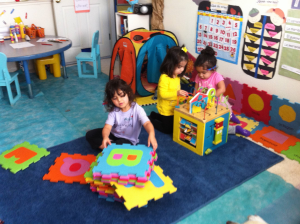PHILOSOPHY AND VALUES
We believe that the first years of a child’s life is, by far, the most important time to lay the foundation for all intellectual and emotional development. We believe through nurturing, individualized attention and encouragement each child will use their imagination and creativity. 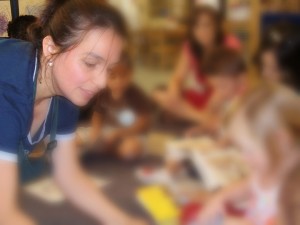 Every child is guided through the day with positive reinforcement in all activities, continual encouragements to try again (not give up), and is never pressured into participation of any activity. A child imitates verbally and visually what they see and hear. Although we might think they aren’t listening, their subconscious is attentive to what’s going on around them. A nurturing, loving environment with clear expectations gives them the foundation from which they learn upon and benefit. Every day through games we strengthen manners, respect, sharing, co-operation and independence. During Circle Time we practice listening skills and comprehension, taking turns, singing songs, engaging story times, as well as learn colors, shapes, alphabet, numbers, new words and ideas. Fine and gross motor skills, hand-eye coordination are important areas of development in our children, as well.
Every child is guided through the day with positive reinforcement in all activities, continual encouragements to try again (not give up), and is never pressured into participation of any activity. A child imitates verbally and visually what they see and hear. Although we might think they aren’t listening, their subconscious is attentive to what’s going on around them. A nurturing, loving environment with clear expectations gives them the foundation from which they learn upon and benefit. Every day through games we strengthen manners, respect, sharing, co-operation and independence. During Circle Time we practice listening skills and comprehension, taking turns, singing songs, engaging story times, as well as learn colors, shapes, alphabet, numbers, new words and ideas. Fine and gross motor skills, hand-eye coordination are important areas of development in our children, as well. 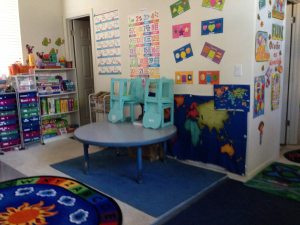 Our goal is to provide all of the children in our care, a clean, safe, comfortable, loving and environment where they can play and learn. Respect toward self, others and the environment are emphasized. I believe in the value of both structured and flexible schedules.
Our goal is to provide all of the children in our care, a clean, safe, comfortable, loving and environment where they can play and learn. Respect toward self, others and the environment are emphasized. I believe in the value of both structured and flexible schedules. 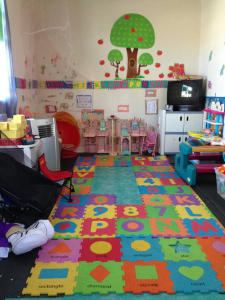 Activities include the use of a preschool curriculum, regular reading times, arts and crafts, and musical activities. Outdoor play, free play, are some of the more flexible activities we have. The most important priority is to learn while having FUN!
Activities include the use of a preschool curriculum, regular reading times, arts and crafts, and musical activities. Outdoor play, free play, are some of the more flexible activities we have. The most important priority is to learn while having FUN! 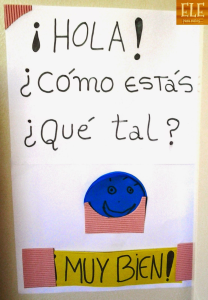 Another priority is to teach in Spanish. While this may pose a challenge initially, we have seen children quickly overcome. We consider this the best stage in a child’s life to introduce a foreign because it is easier for them to learn. Studies have shown children who are exposed to other languages also do better in school, score higher on standardized tests, are better problem solvers and are more open to diversity. Early introduction to the Spanish language also improves the children’s critical thinking ability. When learning a new language, mental capacities are challenged and therefore trained to think more comprehensively. This will not only help the kids in learning the language but also in their daily mental activities. However, many may argue that teaching kids Spanish may force them to think harder than is necessary. This is not accurate. Research points out, the part of the brain that is active when learning a new language is, in fact, most responsive at ages 3 to 6. Therefore, learning Spanish at this point does not in any way contradict the natural skills of the children. It actually utilizes the kids’ optimum potential for learning a foreign language.
Another priority is to teach in Spanish. While this may pose a challenge initially, we have seen children quickly overcome. We consider this the best stage in a child’s life to introduce a foreign because it is easier for them to learn. Studies have shown children who are exposed to other languages also do better in school, score higher on standardized tests, are better problem solvers and are more open to diversity. Early introduction to the Spanish language also improves the children’s critical thinking ability. When learning a new language, mental capacities are challenged and therefore trained to think more comprehensively. This will not only help the kids in learning the language but also in their daily mental activities. However, many may argue that teaching kids Spanish may force them to think harder than is necessary. This is not accurate. Research points out, the part of the brain that is active when learning a new language is, in fact, most responsive at ages 3 to 6. Therefore, learning Spanish at this point does not in any way contradict the natural skills of the children. It actually utilizes the kids’ optimum potential for learning a foreign language.

